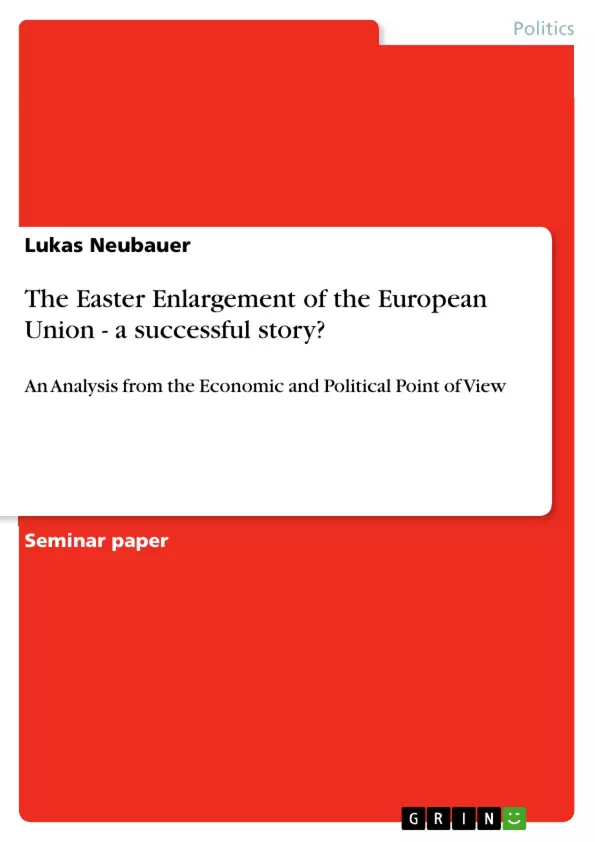Structure
1. Introduction – The Integrative Task of the EU
2. The Economic Perspective: A Win-Win-Situation
2.1 Perception of the Enlargement
2.2 The Convergence Process of the New Member States
2.3 The Four Fundamental Freedoms of the European Union
2.3.1 The Free Movement of Goods
2.3.2 The Free Movement of Services
2.3.3 The Free Movement of Person
2.3.4 The Free Movement of Capital
3. The Political Perspective: A necessary but tough Step?
3.1 The Historical and Ideological Point of View
3.2 The Impact on Domestic Policies
3.3 The Impact on Foreign Affairs
4. Conclusion
5. Bibliography
5.1 Monographs and articles from journals and collections
5.2 Online Publications
Inhaltsverzeichnis (Table of Contents)
- Introduction – The Integrative Task of the EU
- The Economic Perspective: A Win-Win-Situation
- Perception of the Enlargement
- The Convergence Process of the New Member States
- The Four Fundamental Freedoms of the European Union
- The Free Movement of Goods
- The Free Movement of Services
- The Free Movement of Persons
- The Free Movement of Capital
- The Political Perspective: A necessary but tough Step?
- The Historical and Ideological Point of View
- The Impact on Domestic Policies
- The Impact on Foreign Affairs
- Conclusion
Zielsetzung und Themenschwerpunkte (Objectives and Key Themes)
This seminar paper aims to analyze the economic and political implications of the Eastern Enlargement of the European Union in 2004, focusing specifically on Germany and the eight new member states (NMS-8). The paper examines whether the Enlargement was a successful endeavor for both the existing and newly admitted member states.
- The economic impact of the Enlargement on both old and new member states
- The convergence process of the NMS-8 towards market-economical democracies
- The role of EU programs and financial support in facilitating the transformation process
- The challenges and benefits of the four fundamental freedoms of the European Union for the NMS-8
- The political aspects of the Enlargement, including historical and ideological considerations and its impact on domestic and foreign policies.
Zusammenfassung der Kapitel (Chapter Summaries)
- Introduction – The Integrative Task of the EU: This chapter provides a general overview of the European Union's history and its ongoing integration process. It introduces the 2004 Enlargement, the addition of eight central and eastern European countries and two southern European islands, and the subsequent challenges and expectations. The chapter outlines the focus of the paper on Germany and the NMS-8 from both economic and political perspectives.
- The Economic Perspective: A Win-Win-Situation: This chapter explores the economic perspectives on the Enlargement. It addresses varying perceptions, including initial concerns about costs and potential negative impacts. It then focuses on how the EU has supported the economic transformation of the NMS-8 towards market economies and analyzes the positive effects of the four fundamental freedoms of the European Union.
- The Convergence Process of the New Member States: This section elaborates on the EU's role in supporting the transformation process of the NMS-8. It highlights the Copenhagen criteria set in 1993 and the EU's financial programs, including PHARE, SAPARD, and ISPA, aimed at facilitating the economic and political transition. It also presents statistical evidence demonstrating the success of this transformation process.
- The Political Perspective: A necessary but tough Step?: This chapter examines the political implications of the Enlargement. It explores the historical and ideological context, focusing on the transition from communist regimes to democratic systems. The chapter further analyzes the impact of the Enlargement on domestic policies within the NMS-8 and its effects on foreign affairs.
Schlüsselwörter (Keywords)
This seminar paper focuses on the Eastern Enlargement of the European Union in 2004, exploring its economic and political impact. Key terms include: EU Enlargement, NMS-8, convergence process, transformation, market economy, democracy, fundamental freedoms, economic welfare, political integration, domestic policies, foreign affairs, and EU financial programs like PHARE, SAPARD, and ISPA.
Frequently Asked Questions
What was the primary goal of the 2004 Eastern Enlargement?
The goal was to integrate central and eastern European countries into the EU, fostering democratic stability and market-economic transformation after the end of the Cold War.
Which countries are included in the NMS-8 group?
The NMS-8 refers to the eight central and eastern European countries that joined in 2004: Czech Republic, Estonia, Hungary, Latvia, Lithuania, Poland, Slovakia, and Slovenia.
What are the Copenhagen criteria?
Set in 1993, these criteria required candidate states to have stable democratic institutions, a functioning market economy, and the ability to adopt EU obligations.
How did EU financial programs like PHARE and SAPARD help?
These programs provided financial assistance for institutional building, infrastructure, and agricultural modernization to prepare the new states for membership.
Was the Eastern Enlargement an economic success for Germany?
The paper analyzes it as a win-win situation, where Germany benefited from new export markets and the NMS-8 experienced significant economic convergence.
- Citation du texte
- Lukas Neubauer (Auteur), 2009, The Easter Enlargement of the European Union - a successful story?, Munich, GRIN Verlag, https://www.grin.com/document/154292



